在很多会话端上,应用开发者会开发自己的H5页面,并创造一些个性化的卡片,比如标题文本卡片、图片卡片、点选卡片等,这些卡片可以在不同的会话端被渲染成不同的样式,但是数据存储的结构是相同的。例如,在某个业务的会话端中,标题文本卡片的数据格式如下:
文本卡片数据格式
{
"cardType": "TextCard",
"content": {
"title": "your title",
"text": "your text"
}
}一般情况下, 开发者希望将调用第三方接口返回的数据,通过格式转换,变成期待的卡片数据格式,以达到动态生成卡片的效果。例如,在查天气的例子当中,开发者希望根据实时查询到的天气结果,动态生成标题卡片数据,生成的卡片如下:
{
"cardType": "TextCard",
"content": {
"title": "2018-08-30",
"text": "Temperature is 28"
}
}首先构建对话流,如下图所示:

其中“调用查天气API”节点为调用第三方查天气接口的函数节点,“动态生成卡片数据”节点为自定义代码函数节点。第三方查天气接口返回的数据格式如下:
HTTP接口返回数据格式
{
"forecast": [
{
"date": "2018-08-30",
"temperature": "28"
},
{
"date": "2018-08-31",
"temperature": "30"
}
]
}示例代码
在“动态生成卡片数据”函数节点中,关联到一个函数计算Function,在代码中,首先将eventObj中的lastOutputForFunction字段反序列化成Object,然后将它其中的forecast[0]的date和temperature字段用于构造卡片对象card,最后将card序列化成字符串格式赋值给overrideResponse的htmlText字段。overrideResponse的htmlText字段一旦被赋值后,机器人这轮对话最终的输出就将是这个值。
Node.js
module.exports.handler = function(event, context, callback) {
/** event structure definition
For more details please VIEW DOCS HERE: https://lark.alipay.com/docs/share/1b48172d-0814-4a28-9ea0-3686a5bdb4a0
{
// read-only variables
"environment": "Object",
"lastOutputForFunction": "String",
"slotSummary": "Object",
// read/write variables
"global": "Object",
"outputForResponse": "Object",
"outputForFunction": "String",
"routeVariable": "String"
}
**/
try {
var eventObj = JSON.parse(event);
// // add your code here
var lastFunctionOutput = JSON.parse(eventObj.lastOutputForFunction);
var todayForecast = lastFunctionOutput.forecast[0];
var date = todayForecast.date;
var temp = todayForecast.temperature;
var card = {};
card["cardType"] = "TextCard";
card["content"] = {"title": date, "text":"Temperature is " + temp};
eventObj.overrideResponse.htmlText = [JSON.stringify(card)];
eventResult = JSON.stringify(eventObj);
callback(null, eventResult);
} catch (e) {
console.log(e);
eventResult = JSON.stringify(eventObj);
callback(null, eventResult);
//callback(null, e);
}
};Python
# -*- coding: utf-8 -*-
import logging
import json
def handler(event, context):
logger = logging.getLogger()
logger.info(event)
eventObj = json.loads(event)
lastFunctionOutput = json.loads(eventObj['lastOutputForFunction'])
todayForecast = lastFunctionOutput['forecast'][0]
date = todayForecast['date']
temp = todayForecast['temperature']
card = {'cardType': 'TextCard'}
card['content'] = {'title': date, 'text': 'Temperature is ' + temp}
eventObj['overrideResponse'] = {'htmlText':[json.dumps(card)]}
return eventObjJava
package com.aliyun.openservices.tcp.example.handler;
import com.alibaba.fastjson.JSON;
import com.alibaba.fastjson.JSONArray;
import com.alibaba.fastjson.JSONObject;
import com.aliyun.fc.runtime.Context;
import com.aliyun.fc.runtime.PojoRequestHandler;
/**
* Created by weili on 2018/8/2.
*
* @author weili
* @date 2018/08/02
*/
public class FunctionHandler implements PojoRequestHandler<JSONObject, JSONObject> {
@Override
public JSONObject handleRequest(JSONObject eventObj, Context context) {
/**
* eventObj structure definition
*
* read-only variables
* "environment": "Object",
* "lastOutputForFunction": "String",
* "slotSummary": "Object",
*
* read/write variables
* "global": "Object",
* "overrideResponse": "Object",
* "functionOutput": "String",
* "routeVariable": "String"
*/
JSONObject lastFunctionOutput = JSON.parseObject(eventObj.getString("lastOutputForFunction"));
JSONObject todayForecast = lastFunctionOutput.getJSONArray("forecast").getJSONObject(0);
String date = todayForecast.getString("date");
String temp = todayForecast.getString("temperature");
JSONObject card = new JSONObject();
card.put("cardType", "TextCard");
JSONObject content = new JSONObject();
content.put("title", date);
content.put("text", "Temperature is " + temp);
card.put("content", content);
JSONArray htmlText = new JSONArray();
htmlText.add(card.toJSONString());
JSONObject overrideResponse = new JSONObject();
overrideResponse.put("htmlText", htmlText);
eventObj.put("overrideResponse", overrideResponse);
return eventObj;
}
}该文章对您有帮助吗?
